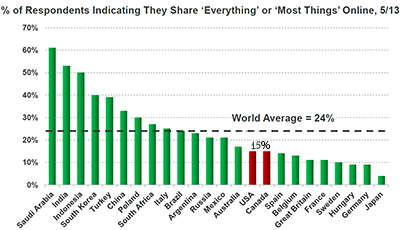I recently saw a fascinating presentation from KPCB entitled ”Internet Trends 2013” where I came across the above chart from Ipsos OTX. It basically illustrates current comfort levels with “online sharing” across numerous countries around the world (note: I modified the chart by also highlighting Canada in red).
Context
The survey was published on May 14, 2013. The underlying data was derived from an online survey (weighted sample size of 12,000 across 24 countries) conducted between January 1-18, 2013. The survey question was “Describe how much you share online (including status updates, feelings, photos, videos, links, etc…)”. The chart shows only people that responded by selecting either “Everything” or “Most Things”.
Key findings that can be derived from this survey
- On average 24% of online users in any of the 24 surveyed countries share everything or most things online.
- Citizens of Saudi Arabia, India and Indonesia are the most prolific online sharers of content coming in at 61%, 53% and 50% respectively.
- Both Canada and the United States are underachievers when it comes to online sharing, currently topping out at about 15% of the online population.
Key explanations for these findings (in my personal opinion)
Cultural differences –> When comparing the two extremes of Saudi Arabia (61% sharing) to Japan (4% sharing) using Geert Hofstede’s cultural dimensions , a noticeable difference can be found in the “Individualism vs. Collectivism” dimension. What do these terms mean?
- Individualism: a preference for a loosely-knit social framework in which individuals are expected to take care of themselves and their immediate families only”. Privacy is highly valued.
- Collectivism (its opposite): represents a preference for a tightly-knit framework in society in which individuals can expect their relatives or members of a particular in-group to look after them in exchange for unquestioning loyalty. A society’s position on this dimension is reflected in whether people’s self-image is defined in terms of “I” or “we.” Sharing with the broader community is part of life. (Source: Geert-Hofstede.com).
Upon using the CultureGPS app, (which is based on Hofstede’s research) Saudi Arabia scores very highly on collectivism relative to Japan, which in my opinion greatly explains the results. Germany (which is also on the low sharing end of the spectrum) similarly scored low on collectivism and high on individualism. Germans are in fact known to highly value privacy as evidenced in numerous publicized cases involving residents chasing out the Google Street View Car as well as the amount of social media related cases in court attempting to enforce German Privacy Law (and rightly so, as now evidenced by the whole NSA/Merkel fiasco).
Mobile first mindset–> Even though Canada now has a very high smartphone penetration rate of nearly 63%, we aren’t quite there yet in terms of living and breathing “mobile first”. On the other hand, the top “sharing” countries on the chart (Saudi Arabia, India and Indonesia) all have a high percentage of citizens for whom mobile devices are their first and sometimes only entry point to the internet. This means that their behaviours have been built around sharing, which has been made extremely easy on smartphones thanks to their cameras, gps, connectivity 24/7, etc…
Canadian context
- In Canada there are approximately 34.88 Million people of which 86.8% have access to the internet.
- This means that there are approximately 30.27 Million internet users in Canada
- Based on this survey, it can therefore be concluded that approximately 4.54 Million Canadians (i.e. 15% of the above) are sharing “everything” or “most things” online.
Needless to say, that is still a hefty amount of people that are prolifically feeding formerly private content into the public web, which in turn is searched by nearly all internet users (including non-sharers) daily.
I am very curious as to how much more these numbers will rise over time. It will essentially come down to whether or not the potential behavioural impact of technology is great enough to overcome the inherent cultural traits many of us have been raised with.
Cheers,
MK
Special Notice: If you work in the public sector you may want to look into the 6th annual Public Sector Social Media conference put on by the Conference Board of Canada. It takes place next week on November 5-6 at the beautiful Chateau Laurier in Ottawa. If you use promo code PRM7 you’ll get a discount online. If you can’t make it , be sure to at least track the #PSSM2013 hashtag during the event!





Leave a Reply
You must be logged in to post a comment.